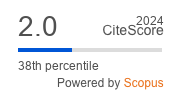Professional achievements in medicine: Too many unresolved questions
Keywords:
Medical student, Collaborative learning, Social negotiation skills, Non-cognitive skillsAbstract
From pre-enrollment assessments, through medical education andpost-graduate training, medical schools are trying to educate andfacilitate the development of their students so that they become exemplaryexperts in their future fields. Yet despite the long history ofmedical education, scientific research has failed to provide correlationsbetween medical schools’ education processes and achievementsof their students. Among the greatest obstacles for this is the primarydefinition of achievement, and, subsequently, its characteristics andmeasurement. In this review we present current findings related tomedical education, discuss their implications and provide suggestionsfor medical schools on how to get the best out of their students whilefacilitating their personal growth.References
Working Party of the Royal College of Physicians. Doctors in society. Medical professionalism in a changing world. Clin Med. 2005;5:5-40.
Hamdy H, Prasad K, Anderson MB, Scherpbier A, Williams R, Zwierstra R, et al. BEME systematic review: predictive values of measurements obtained in medical schools and future performance in medical practice. Med Teach. 2006;28(2):103-16.
Coulter A. Patients’ views of the good doctor. BMJ. 2002;325(7366):668-9.
Price PB, Taylor CW, Nelson DE, et al. Measurement and predictors of physician performance: two decades of intermittently sustained research. Salt Lake City: Aaron Press; 1971. p. 121-49.
Sade RM, Stroud MR, Levine JH, Fleming GA. Criteria for selection of future physicians. Ann Surg. 1985;201(2):225-30.
Powis DA, Neame RL, Bristow T, Murphy LB. The objective structured interview for medical student selection. Br Med J (Clin Res Ed) 1988;296:765-8.
Barnsley L, Cameron R, Engel CE, et al. Ratings of performance of graduates from traditional and non-traditional medical schools. Teach Learn Med. 1994;6:179-84.
Haight S, Slavin S, Schindler D. Predicting Medical Student Perfomance: Cognitive and Non-Cognitive Variables Indenpendently Predict Perfomance of Afferent Stages of Medical Education. In. 2011 Spring Conference Program Abstracts. Entering A New Decade of Medical Education. All
CGEA Conference activities will be conducted at the University of Nebraska Medical Center, March 17-19, 2011.
Schernhammer ES, Coliditz G. Suicide Rates Among Physicians: A Quantitative and Gender Assessment (Meta Analysis). Am J Psyciatry. 2004;161:2295-302.
Chambers R. Avoiding Burnout in General Practice. Br J Gen Pract. 1993:442-3.
Schmidt FL, Hunter JE. The validity and utility of selection methods in personnel psychology: practical and theoretical implications of 85 years of research findings. Psychol Bull. 1998;124:262-74.
Cullen MW, Reed DA, Halvorsen AJ, Wittich CM, Kreuziger LM, Keddis MT, et al. Selection criteria for internal medicine residency applicants and professionalism ratings during internship. Mayo Clin Proc. 2011;86(3):197-202.
General Medical Council. Tomorrow’s Doctors. Recommendations on Undergraduate Medical Education. London: GMC; 1993 and 2009.
Kopelman LM. Development of the medical humanities program at East Carolina University. Acad Med. 1989;64(12):730-4.
Cahn SM. Classic and Contemporary Readings in the Philosophy of Education. New York, NY: Mc-Graw Hill; 2011.
Pangercić A, Sambunjak D, Hren D, Marusić M, Marusić A. Climate for career choices: survey of medical students’ motivation for studying, career preferences and perception of their teachers as role models. Wien Klin Wochenschr. 2010;122(7-8):243-50.
Hendricson WD, Andrieu SC, Chadwick DG, Chmar JE, Cole JR, George MC et al. Educational strategies associated with development of problem-solving, critical thinking, and self-directed learning. J Dent Educ. 2006;70(9):925-36.
Downie RS, Hendry RA, Macnaughton RJ, Smith BH. Humanizing medicine: a special study module. Med Educ. 1997;31(4):276-80.
Strand S. Consistency in reasoning test scores over time. Br J Educ Psychol. 2004;74(4):617-31.
Kulatunga-Moruzi C, Norman GR. Validity of admissions measures in predicting performance outcomes: the contribution of cognitive and non-cognitive dimensions. Teach Learn Med. 2002;14(1):34-42.
Downie RS. Medical Humanities: means, ends, and evaluation. In: Evans M, Finlay I, editors. Medical Humanities. London: BMJ; 2001. p. 205-16.
Wershof Schwartz A, Abramson JS, Wojnowich I, Accordino R, Ronan EJ, Rifkin MR. Evaluating the impact of the humanities in medical education. Mt Sinai J Med. 2009;76(4):372-80.
Han WH, Maxwell SR. Are medical students adequately trained to prescribe at the point of graduation? Views of first year foundation doctors. Scott Med J. 2006;51(4):27-32.
Simunovic VJ, Hozo I, Rakic M, Jukic M, Tomic S, Kokic S, et al. New paradigm in training of undergraduate clinical skills: the NEPTUNE-CS project at the Split University School of Medicine. Croat Med J. 2010;51(5):373-80.
Butler D. University rankings smarten up. Nature. 2010;464(7285):16-7.
Sambunjak D, Straus SE, Marusic A. A systematic review of qualitative research on the meaning and characteristics of mentoring in academic medicine. J Gen Intern Med. 2010;25(1):72-8.
Sambunjak D, Marusic A. Mentoring: what’s in a name? JAMA. 2009;16;302(23):2591-2.





